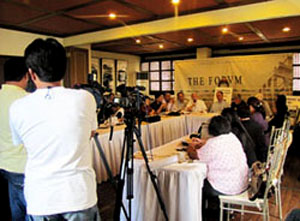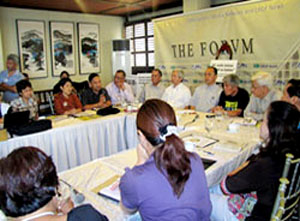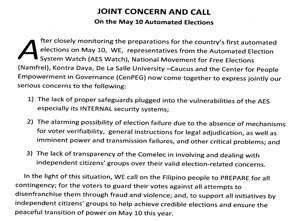Citizens’ watchdogs: Guard votes, ensure peaceful power transition
The Center for People Empowerment in Governance (CenPEG) has joined the country’s biggest citizens’ watchdogs in calling for greater vigilance in the May 10 automated elections.
CenPEG, together with the Automated Election System Watch (AES Watch), National Movement for Free Elections (Namfrel), Kontra Daya, DLSU-Caucus and other groups, also pledged to support independent citizens’ organizations in working for a peaceful transition of political power.
The common pledge was made in a joint statement issued by the multi-sectoral groups during a media forum, Kapihan sa Ilustrado, Intramuros, Manila on March 23, 2010. (Please refer to the joint statement)
The media forum was hosted by the Catholic Media Network (CMN) of the Catholic Bishops Conference of the Philippines (CBCP) with Fr. Francis Lucas acting as moderator. The media forum also presented the election program of the Cebu-based Dilaab Foundation headed by Fr. Carmelo Diola.
Issuing the joint call were, among others, Alfredo Pascual, president of the University of the Philippines Alumni Association (UPAA) and co-convener of AES Watch; Bobby Tuazon, Director for Policy Studies of CenPEG and co-convener of AES Watch; Danny Magbual and David Balangue, Namfrel spokesperson and vice-chair, respectively; Fr. Joe Dizon, Kontra Daya (an anti-fraud group); and Sherwin Ona of the DLSU-Caucus.
The groups expressed their serious concerns over “the lack of proper safeguards plugged into the vulnerabilities of the AES especially its internal security systems, the alarming possibility of election failure due to the absence of mechanisms for voter verifiability, source code review, general instructions for legal adjudication, as well as imminent power and transmission failures and other critical problems.”
They pledged “to support all initiatives by independent citizens’ groups to help achieve credible elections and ensure the peaceful transition of power on May 10.”
“More than ever,” Tuazon said in a separate statement, “greater vigilance is needed today to ensure the peaceful transition of power based on the sovereign will of the people.”
Faith and good intentions are not enough
AES Watch spokesperson Pascual said that “good intentions” and “faith in Comelec” are not enough as he emphasized the need to ensure the automated election system’s ability “to operate securely, properly, and accurately.”
Magbual, on the other hand, said that Namfrel will continue to watch the elections despite being denied accreditation by the Commission on Elections (Comelec).
Among the issues that Namfrel is closely monitoring, Magbual said, is the conduct of the random manual audit (RMA) before proclamation and ensuring the integrity of the voters’ list.
Fr. Dizon said Kontra Daya has for months forwarded its concerns to the Comelec but the poll body has failed to reply with satisfactory answers. Among the issues raised by the anti-fraud group were the 1.7 million ballots for the ARMM with no NPO security markings, the lack of material time to finish ballot printing, and the party lists with suspected ties to outgoing President Gloria Macapagal-Arroyo.
These are “uncertain” times, said Dizon. The lack of credibility of the incumbent administration, he said, is causing reasons for the people’s mistrust.
“We have a president who doesn’t want to leave,” he said.
The groups also echoed calls on the need to conduct another mock election.
“The mock election is an opportunity to convince the public that the system is working,” said Pascual.
Ona, meanwhile said, that mock elections should be “reality-based” – in sites which reflect the various conditions in the country and with 1,000 voters - and using “industry standard” practices.
Magbual criticized Comelec’s mock election last February 6 as a “mockery,” rather than a real mock election.
“When you use modern technology, simulate exactly what would happen on election day,” he said.
Dizon warned that “failure of elections is the more likely scenario” because of the “incompetence of Comelec.”
“We are now sharpening our focus on the political conditions that are fast shaping up,” said Tuazon, emphasizing that the political process at play will also determine the success or failure of the automated elections.
‘We are on a ‘disaster preparedness mode’ for the next 49 days,” Tuazon said. CenPEG News

The March 23 media forum where the joint call for voters' vigilance and peaceful transition is announced (CenPEG photo)
Journalist reads copy of "Joint Concern and Call" (CenPEG photo)

Prof. Sherwin Ona of DLSU-Caucus (left panel with microphone) talks about the lack of Comelec preparations and training in the provinces (CenPEG photo)
- Probing presidential platforms
- Conference calls for people-centered policy actions for Asian development and peace
- WWII 'comfort women' urge visiting Japanese emperor: OFFICIAL GOV’T APOLOGY, UPHOLD TRUTH, and JUST COMPENSATION
- FEARLESS FORECAST (EPISODE II): Comelec will not comply with e-Commerce Law in 2016 elections
- Fearless forecast: Comelec’s non-compliance with the AES law in 2016 (last of 2 parts)
- Fearless forecast: Comelec will not comply with the AES law in 2016
- CenPEG releases travelogue
- Experts: Nuisance bets reflect disillusionment, uneven playing field
- Partylist solon presses for tax cuts
- The True Cost of a Political Campaign
- Management decisions: Based on RA 9369 or purely Comelec’s?
- CenPEG holds 1st roundtable with media on presidential poll results
- Filipino IT can do it!
- FIT4E: The only transparent solution
- Realpolitik in the maritime tiff
- China’s challenge to PH sovereignty
- Choosing the next president
- Fixing the presidency, reforming the state
- New Comelec chair says he’s open to other election technologies
- SC ruling on AES Watch Pabillo and IBP vs Comelec, Smartmatic-TIM
- Comelec must explain P3.2B unliquidated cash advances
- CONGRESS ASKED TO HOLD DEMO ON PCOS HACKING
- 25 Bishops ask poll body to stop midnight deal with Smartmatic
- Pope Francis: reform and conversion
- 2 poll watch coalitions stage rally vs Comelec-Smartmatic midnight deal
- AES Watch questions Comelec-Smartmatic midnight deal
- ASEAN-India: Building Youth Partnerships through Culture and Entrepreneurship
- CenPEG forges research exchange and partnership with Jinan University
- FOI: Bearing fruit or foiled again?
- Remittance with Representation: The right to vote of overseas Filipinos
Center for People Empowewrment in Governance (CenPEG), Philippines. All rights reserved



